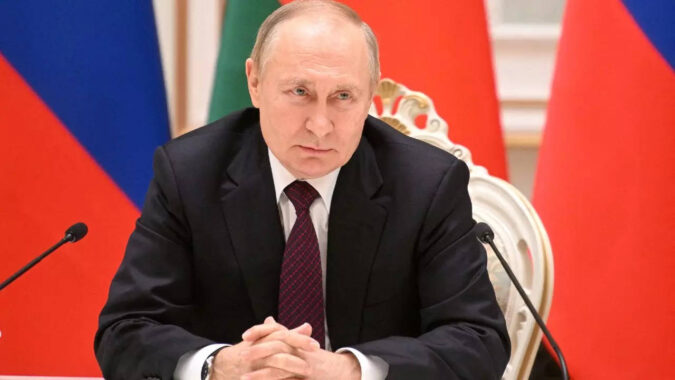MOSCOW: Russian President Vladimir Putin said that the Wagner private military company ‘simply doesn’t exist’ as a legal entity, in comments adding to the series of often bizarre twists that have followed the group’s abortive revolt last month — the most serious threat to Putin’s 23-year rule amid the war in Ukraine.
“There is no law on private military organisations. It simply doesn’t exist,” Putin told a Russian newspaper late Thursday, referring to the Wagner group.
Putin recounted to Kommersant his own version of a Kremlin event attended by 35 Wagner commanders, including the group’s chief, Yevgeny Prigozhin, on June 29. That meeting came just five days after Prigozhin and his troops staged a stunning but short-lived rebellion against Moscow authorities.
The meeting was revealed earlier this week by a Kremlin official.
Putin said that at the talks, Wagner rejected an offer to keep its troops in Ukraine, where they have played key battlefield roles, under the leadership of their direct commander.
“All of them could have gathered in one place and continued to serve,” Putin told the newspaper, “And nothing would have changed for them. They would have been led by the same person who had been their real commander all along.”
Putin has previously said that Wagner troops had to choose whether to sign contracts with the Russian Defence Ministry, move to neighbouring Belarus or retire from service.
According to Putin, although “many nodded” when he made his proposal, Prigozhin rejected the idea, responding that “the boys won’t agree with such a decision.”
This, Putin said, was one of “several employment options” put forward at the meeting.
During the revolt that lasted less than 24 hours, Prigozhin’s mercenaries quickly swept through the southern Russian city of Rostov-on-Don and captured the military headquarters there without firing a shot, before driving to within about 200 kilometres of Moscow.
Prigozhin described the move as a “march of justice” to oust the military leaders, who demanded that Wagner sign contracts with the defence ministry by July 1.
The fate of Prigozhin and the terms of a deal that ended the armed rebellion by offering amnesty for him and his mercenaries, along with permission, to move to Belarus remain cloudy.
Wagner mercenaries are completing the handover of their weapons to the Russian military, the Defence Ministry said Wednesday.
Their disarming of Wagner reflects efforts by Russian authorities to defuse the threat they posed and also appears to herald an end to the mercenary group’s operations on the battlefield in Ukraine, where Kyiv’s forces are engaged in a counteroffensive.
“There is no law on private military organisations. It simply doesn’t exist,” Putin told a Russian newspaper late Thursday, referring to the Wagner group.
Putin recounted to Kommersant his own version of a Kremlin event attended by 35 Wagner commanders, including the group’s chief, Yevgeny Prigozhin, on June 29. That meeting came just five days after Prigozhin and his troops staged a stunning but short-lived rebellion against Moscow authorities.
The meeting was revealed earlier this week by a Kremlin official.
Putin said that at the talks, Wagner rejected an offer to keep its troops in Ukraine, where they have played key battlefield roles, under the leadership of their direct commander.
“All of them could have gathered in one place and continued to serve,” Putin told the newspaper, “And nothing would have changed for them. They would have been led by the same person who had been their real commander all along.”
Putin has previously said that Wagner troops had to choose whether to sign contracts with the Russian Defence Ministry, move to neighbouring Belarus or retire from service.
According to Putin, although “many nodded” when he made his proposal, Prigozhin rejected the idea, responding that “the boys won’t agree with such a decision.”
This, Putin said, was one of “several employment options” put forward at the meeting.
During the revolt that lasted less than 24 hours, Prigozhin’s mercenaries quickly swept through the southern Russian city of Rostov-on-Don and captured the military headquarters there without firing a shot, before driving to within about 200 kilometres of Moscow.
Prigozhin described the move as a “march of justice” to oust the military leaders, who demanded that Wagner sign contracts with the defence ministry by July 1.
The fate of Prigozhin and the terms of a deal that ended the armed rebellion by offering amnesty for him and his mercenaries, along with permission, to move to Belarus remain cloudy.
Wagner mercenaries are completing the handover of their weapons to the Russian military, the Defence Ministry said Wednesday.
Their disarming of Wagner reflects efforts by Russian authorities to defuse the threat they posed and also appears to herald an end to the mercenary group’s operations on the battlefield in Ukraine, where Kyiv’s forces are engaged in a counteroffensive.
